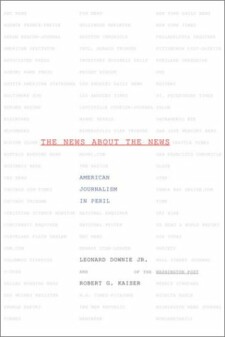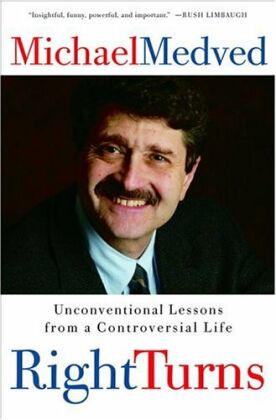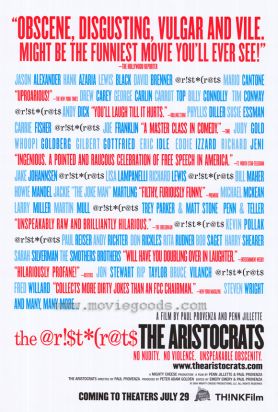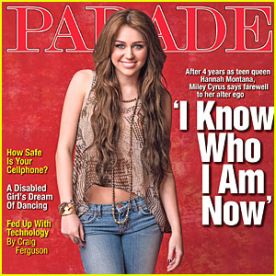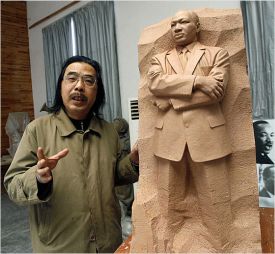American Journalism Not In Peril Enough
From National ReviewTHE NEWS ABOUT THE NEWS:
AMERICAN JOURNALISM IN PERIL
by Leonard Downie Jr. and Robert G. Kaiser
Alfred A. Knopf, 294 pp., $25
0 375 40874 6
When, back in 1985, the “Westland affair” almost brought down Mrs
Thatcher’s government, I remember a curious statement by her then-defense
minister, Michael Heseltine, who had started the whole thing. Westland was a
small British manufacturer of helicopters which would have failed without the
sale of a significant minority shareholding to either the Sikorsky company of
America or a European consortium. Heseltine favored the Europeans, Mrs Thatcher
and her trade secretary, Leon Brittan, favored the American bid. Heseltine ended
up resigning from the cabinet on the grounds that Sikorsky’s stake would
ultimately mean that Westland’s highly- skilled workforce would become just
“metal-bashers for the Americans.” As it was, he said, Westland made
“the best helicopters in the world.” They just couldn’t get
enough people to buy them to stay in business.
Possibly he was right, but I wondered then and still wonder now about that
use of the word “best.” Could it be possible that Westland was
making a kind of ideal, Platonic helicopter, a helicopter that was nearer to
God’s own idea of what a helicopter ought to be than any other helicopter
on earth? If so, were considerations of price and functionality irrelevant? If
someone sets up in business to manufacture steam-powered toothpicks and then
finds that no one wants steam-powered toothpicks, is it a mitigation of his
failure to say that he made the “best” steam-powered toothpicks in
the world? Would not the “best” steam-powered toothpick be one that
people actually wanted to buy? Likewise, the best helicopter could not really be
the best — could not even be good — if hardly anyone wanted it,
since to be good it would have to be salable to the public and profitable to its
maker.
But the Heseltinian view of quality in helicopters also informs Leonard
Downie Jr. and Robert G. Kaiser’s view of quality in journalism. The case
made by these editors at the Washington Post that American journalism is
“in peril” rests on an absolutist conception of journalism. To them,
journalism, like art, exists for its own sake. Its quality, or lack of it, is
not to be judged in the market place, by what kind and how much of the stuff
people want to buy, or consume, but according to the “professional”
judgment of connoisseurs like themselves. When the bad guys — large media
corporations with many journalistic properties that are the alleged imperilers
of this volume — press their employees to make those properties more
profitable by reducing the size of the “news hole” and hiring fewer
reporters, they are thought to be vitiating journalistic quality by creating
something that they, or their advertisers, believe more people will want.
If they are wrong, the market will punish them. What is the point of
thunderous moral condemnations? Downie and Kaiser seem to be saying on the one
hand that the corporate philistines are wrong — and that the markets
already are punishing them — and on the other that they are paying
far too much attention to their “profit margins,” which is to say
the market. Surely both things cannot be true? Yet the contradiction passes
almost unnoticed because Downie and Kaiser do not see journalism as being
something for use, like helicopters, but rather something to be judged
only on its own terms. Every now and then they ask themselves, a question like
this: “Does the mediocrity of local television news reflect what viewers
want? Or have they merely become complacent about what they are given?”
But they never really answer it, preferring on the whole to adopt the view of
one of their “experts” that anyone pointing to all the obvious signs
that ordinary people prefer sensationalism and gossip on TV to serious news is
just “masking the subordination of the public’s interest to the
short-term interest of investors.”
Finally, it is September 11th that seems to get them off the hook.
“For much of the 1980s and 1990s,” they write, “American news
organizations had drifted toward softer, sillier, less significant journalism in
a society that didn’t seem to protest. Then an unanticipated national
catastrophe reminded both the providers and consumers of news that good
journalism was not just appealing, but absolutely necessary. Suddenly the
choices between soft and hard, silly and serious news values came into clear
focus.” The implication is that a mass audience temporarily seduced by
Monica or Chandra or O.J. away from their natural love of ponderous,
Washington Post-style discussions of national defense or foreign policy
would henceforth do better in living up to Messrs. Downie and Kaiser’s
expectations of it.
Yet readers of this book may have a different idea of why
“serious” journalists like the authors do not attract more readers.
For their writing is not just dull, it is paralytically dull. An ordinary
journalism textbook (which this resembles) is a page-turner by comparison.
Banality follows banality in a swiftly flowing stream, and we are told for the
third or fourth time that “Television, like radio is a relatively
inefficient conveyor of factual information” and that a typical evening
news broadcast contains many fewer words and subjects than a daily newspaper.
“So,” as if you didn’t know, “television has become
enormously important in our national life, but it has never been a fully
effective information medium.” Indeed, “in modern America television
has become an opiate as well as an entertainment medium.”
Do tell! And why is that? Perhaps it has to do with the fact that, by the
1990s, “ours had become a celebrity-besotted culture, with television the
single most powerful promoter and ratifier of celebrityhood”? It’s a
theory, anyway. But then you may also be interested to know that
“Americans have long been starstruck by celebrities” — as
opposed, I guess, to being starstruck by nonentities. Oh, and here’s
another news-flash: “Television allowed all of us to participate
vicariously in great events all over the world” while its live coverage of
breaking stories was “an important element in the voyeuristic culture of
our times.” That’s because “it can be fascinating and
sometimes highly informative to be able to see big news being made.” Well,
now that you mention it, I guess it can.
True, this great mass of platitude and cliché is occasionally
enlivened by a comically mixed metaphor, as when “the distance between the
citizenry and ‘the news’” is said to have been
“eviscerated” or we are told that “the money machine no longer
worked on automatic pilot.” Also subject to “evisceration” by
wicked corporate types were “the networks’ foreign staffs”
which does indeed seem rather harsh punishment for not being profitable enough.
But then those with an eye to the bottom line are presumably capable of
anything. “The Philadelphia Inquirer,” for example,
“has been deeply shaken by a steady drumbeat of cost cutting, upheavals in
its newsroom management and the departures of dozens of talented staff
members.” Yeah, that cutting drumbeat will shake you all right.
Such awful writing suggests that the real “peril” to American
journalism lies at least as much in its not being lively enough as in its being
too lively, as for instance on local TV news. It is telling when the authors
write that “there is no obvious way to simultaneously shrink a newspaper
and make it better.” Oh really? I fancy that there are more than a few
readers of the Washington Post who could suggest an obvious way to them.
But their obliviousness to their own prolixity, dullness and bad writing is
owing to their insistence on regarding journalism as a “profession”
rather than (as it properly is) a trade. A profession, like law or medicine or
the cure of souls, has attached to it a body of real scholarship which its
practitioners must master. The attempts by schools of journalism, like those of
schools of education, to provide a body of learning in substantiation of their
feeble claim to professionalism, only underline how much unlike their learned
models they really are.
The important knowledge for a journalist is of what he is writing
about, not knowledge of how to be a journalist, which is really a pretty
simple thing. Downie and Kaiser quote Frank Magid, a broadcast consultant, on his worries about the new generation of broadcast journalists who, “while they
may be trained to write and while they may be trained to articulate what is
written. . . have no notion whatsoever about history, geography, political
science, economics and other things about which an informed individual should
have some grasp.” He adds that “unless and until the people in the
profession come to grips with that, there will never be a change.” What he
should have said was that nothing would change unless and until the people in
the profession come to realize that they are not a profession and send
their apprentices back to school to learn not journalism but “history,
geography, political science, economics and other things.” And how to write.Then more people might want to read what they had to say.
Discover more from James Bowman
Subscribe to get the latest posts to your email.

